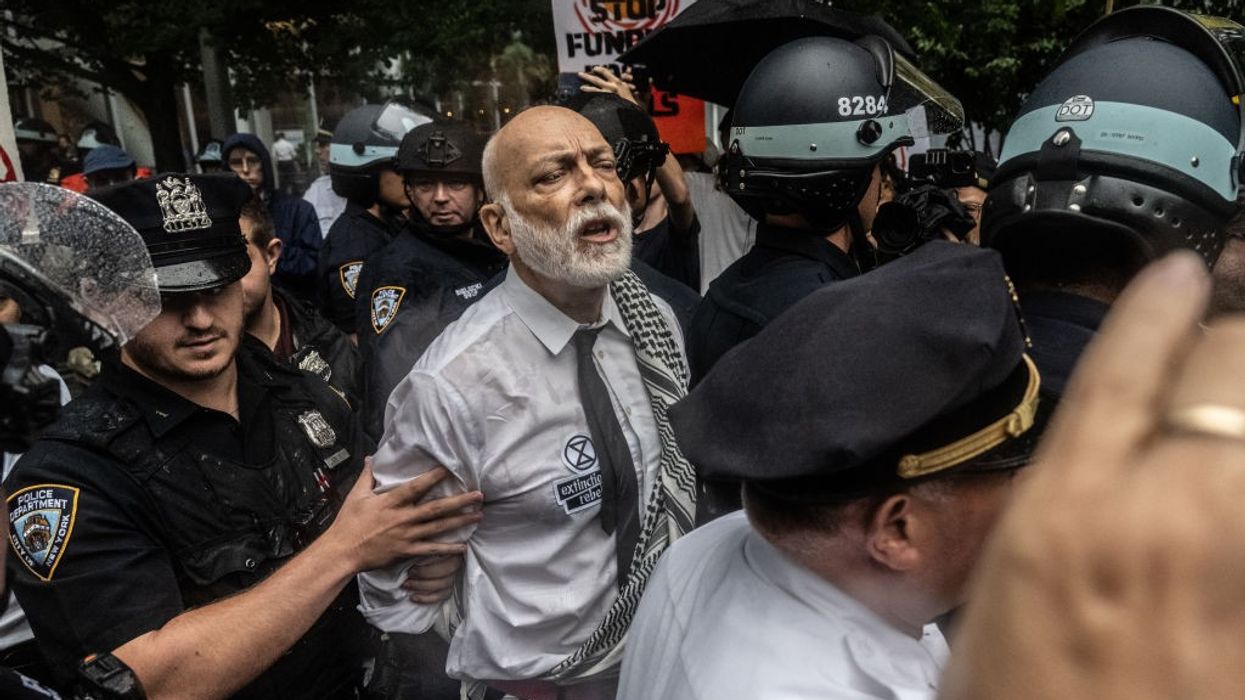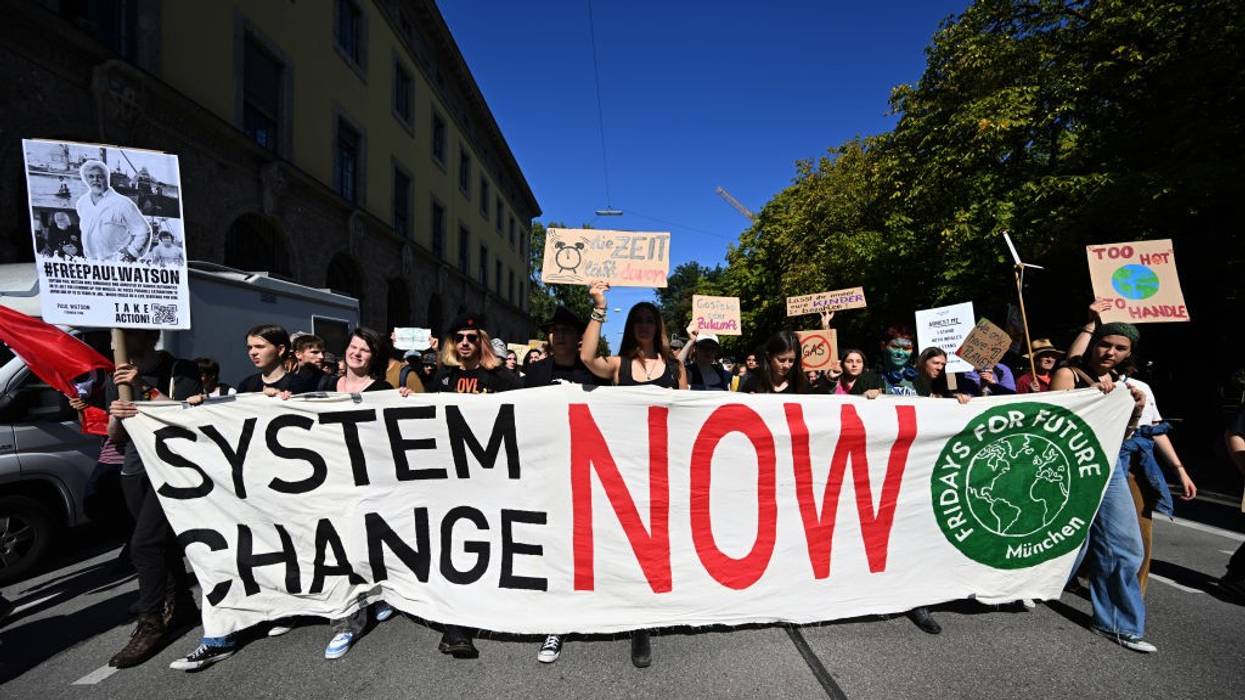Climate Protesters Are Under Attack; a Trump Win Would Make It Worse
On both sides of the Atlantic, volleys of laws threatening long-term imprisonment for nonviolent dissent are being put on the books to cow the climate movement into silence. Trump promises to go further.
In August, climate activist and cellist John Mark Rozendaal was arrested and charged with criminal contempt for playing a few minutes of Bach outside Citibank’s headquarters in New York City. Rozendaal, 63, was prominent in the “Summer of Heat on Wall Street” campaign that targeted Citibank for its prolific financing of fossil-fuel projects. He and a co-defendant now face up to seven years imprisonment if convicted.
Meanwhile in Atlanta, more than 50 justice and environmental activists are awaiting trial on domestic terrorism and other charges arising from their years-long defense of the city’s South River Forest against the construction of an 85-acre police training center there. They are being prosecuted under Georgia’s Racketeer Influenced and Corrupt Organization (RICO) law. Any of them found guilty of “racketeering” would have five to 20 years of imprisonment added to their sentences for the alleged underlying crimes.
Such situations are symptomatic of a grim trend in both the United States and Europe. Nonviolent, nondestructive climate protest is increasingly being subjected to criminal prosecution, while punishments are being ratcheted up to levels befitting violent and far more serious crimes.
The state abuses described in this article should be considered a preview of what is almost guaranteed to be even worse to come if Donald Trump does indeed retake the White House and the Republicans win majorities in the House and Senate.
Across the Global South, such environmental protests are all too often being met by corporate and state forces with extreme extrajudicial violence, especially in Indigenous communities. Here in the Global North, however, the clampdown on protest has largely been through legal action, at least so far. But that might—especially in an America with Donald Trump as its president again—only be a prelude to more violent kinds of suppression as global warming accelerates.
For embattled American climate activists, this trend further raises the stakes of the November 5 election. The crackdowns on climate protest are so far being carried out by state and local governments. But the state abuses described in this article should be considered a preview of what is almost guaranteed to be even worse to come if Donald Trump does indeed retake the White House and the Republicans win majorities in the House and Senate. As recently as October 13, in fact, Trump insisted that, once back in the White House, he’d call in the military to quash domestic dissent of any sort.
In addition, a Trumpian Congress would be likely to pass laws gutting federal climate policies and imposing extreme penalties on future climate protesters. Both prospects also feature prominently in the Heritage Foundation’s Project 2025, produced in part by a gaggle of former Trump officials. That now-infamous blueprint for his possible second administration calls explicitly for—as the Center for American Progress describes it—“suppressing dissent and fomenting political violence.” Among other things, Project 2025 suggests that a future President Trump could invoke the Insurrection Act of 1807, which would indeed allow him to use the military to punish lawful nonviolent protest. And count on it, he’s almost certain to exploit that act if he does indeed become president again.
Gas, Oil, and Cars Over People
Since 2016, 21 states have passed a total of 56 laws criminalizing protest or dramatically increasing the penalties for engaging in it. To be sure, John Mark Rozendaal was arrested in New York, a city located in a blue state, but all the states that have adopted new anti-protest laws are governed by Republican-majority legislatures. And the specific activity most frequently targeted for prosecution is protesting the construction or existence of oil and gas pipelines. (Note that all state laws mentioned below are described in detail in a recent report by the International Center for Not-For-Profit Law, or ICNL.)
The state of Alabama, for example, can now punish a person who simply enters an area containing “critical infrastructure,” including such pipelines, with up to a year in jail and a fine of up to $6,000. If you go near a pipeline in Arkansas, you’re at significantly higher risk: imprisonment of up to six years and a $10,000 fine. Impeding access to a pipeline or a pipeline construction site in Mississippi carries a sentence of up to seven years. Do that in North Carolina as a member of a group and you’ve got even bigger problems. As the ICNL reports, “[A] group of people protesting the construction of a fossil fuel pipeline could face more than 15 years in prison and a mandatory $250,000 fine if they impede or impair the construction of a pipeline.”
Even as protest is being criminalized, assaulting protesters by car is, in effect, being decriminalized.
Many such sentences for protesting are wildly disproportionate to the severity of the act committed. In Florida, trespassing on property that contains pipelines can result in up to five years imprisonment, compared to only 60 days for trespassing just about anywhere else. Enter a pipeline facility in Ohio with the intention of tampering with it in any way and face a potential ten-year sentence. Simply spraying graffiti on an Ohio pipeline installation can carry a six-year sentence, while anyone who “conspires” with the person creating such graffiti could be fined an eye-popping $100,000.
Many climate marches or demonstrations involve walking or standing in roadways. Politicians have been exploiting the fact that “automobile supremacy is inscribed in law by every branch of government and at every level of authority” (in the words of law professor Gregory Shill) to pass highly punitive measures against street protests with little fear of having them overturned. In effect, the laws privilege fossil-fueled vehicles over the human beings who speak out against them.
In May, the Tennessee legislature passed a law that mandates a prison sentence of 2 to 12 years for protesters convicted of knowingly obstructing roadways. In Florida, groups of 25 or more protesters impeding traffic can be charged with “rioting” and face up to 15 years imprisonment. Anyone in Louisiana who does no more than help plan a protest that would impede traffic can be charged with conspiracy or with “aiding and abetting,” even if the protest ends up not hindering traffic or not occurring at all.
In Iowa, being on the street or sidewalk during a vociferous but nonviolent protest can cost you five years in prison, yet (believe it or not) a driver who runs into you during a protest, causing injury, is immune from civil liability if that driver can convince authorities that he or she had taken “due care.”
Laws that permit drivers to run into or over pedestrians engaged in protest have been passed in four states. Three of those laws hit the books in 2021 in the midst of a 16-month period during which American drivers deliberately rammed into groups of protesters a whopping 139 times, according to a Boston Globe analysis. Three victims were killed and at least 100 injured. Drivers were criminally charged in fewer than half of the ramming incidents and in only four was a driver actually convicted of a felony. In other words, even as protest is being criminalized, assaulting protesters by car is, in effect, being decriminalized.
Finally, Louisiana can file RICO charges against people who, as part of a “tumultuous” demonstration, block roads or damage oil or gas pipelines. And protesters beware, since that state’s RICO law carries the possibility of 50 years in prison at hard labor and a $1 million fine. (And yes, you read that right!)
Fresh Legislation, Ready in Minutes!
Many laws that impose severe penalties for protest were passed in the wake of the Indigenous-led campaign against the Dakota Access oil pipeline in 2016-2017. Hundreds of people were arrested in that struggle. More than 700 protesters with the Indigenous Environment Network have been criminalized for their untiring efforts to impede or halt pipeline projects across North America.
If the dozens of state anti-protest laws display many suspicious similarities, that’s no coincidence. In response to pipeline protests, oil and gas companies teamed up with the American Legislative Exchange Council, which draws up “model legislation” for Republicans in statehouses across the country to use as templates for bills that push various corporate and hard-right priorities. Once this genre of legislation was directed toward on-site pipeline protests and passed in state after state, it was also seized upon to criminalize street marches and demonstrations, including those against racist violence, fossil fuels, and other ills—all with “traffic safety” as a pretext.
Following the lead of their kindred state legislators, Republicans in Congress have proposed their own raft of bills criminalizing protest. Fortunately, they haven’t succeeded in getting any of them passed—yet. Many of the bills were prompted by campus protests against U.S.-supported genocide in Gaza or over climate policy and against the fossil-fuel industry.
Some of the congressional bills amounted to less-than-serious grandstanding. One, for instance, would have required a person convicted of “unlawful activity” on a university campus at any time since last October 7 to perform six months of “community service” in Gaza. But there were also dead-serious bills like the one prescribing a prison sentence of up to 15 years for inhibiting traffic on an interstate highway. Other proposed bills would have withheld federal funding (in one case, even pandemic aid) from states that refused to prosecute people who took part in protests on public roadways.
Smashing Human Rights in Europe
Punitive measures against climate protest are reaching new extremes in Europe, too. Since the British Parliament passed harsh new anti-protest laws in 2022, more than 3,000 activists associated with the Just Stop Oil movement have been arrested. According to CNN, “Most of those arrests have been for planning or carrying out direct actions, including slow marching,” which impedes traffic.
In response to such repression, Michel Forst, the United Nations Special Rapporteur on Environmental Defenders, wrote that under the Aarhus Convention (a 1998 agreement most European countries have signed but not the United States), “Whether intended or not, any disruptions that [environmental] actions may cause, such as traffic jams or disturbances to normal economic activity, does not remove the protection for the exercise of fundamental rights during such action under international human rights law.”
In defiance of that principle, the new British laws prescribe a sentence of up to 10 years imprisonment for those convicted of planning protests judged to be a “public nuisance” (which often means disrupting traffic). Such prison terms, noted CNN, are comparable to those for aggravated robbery or rape under British law.
When the climate change group Extinction Rebellion announced an action near The Hague in September 2023, more than 10,000 people of all ages showed up. They’d come to protest the more than $40 billion in subsidies that the Netherlands government gives fossil fuel companies annually. The police blasted the crowd with water cannons, then arrested and hauled away 2,400 protesters, including children.
The group Climate Rights International (CRI) reports that “some democratic countries are even taking measures designed to stop peaceful climate protests before they start.” In June 2023, for instance, German police detained an activist before he could even leave his home to join a climate protest. Five months earlier, a Dutch activist was held in custody for two days to keep him from an action by Extinction Rebellion. He ended up being convicted of sedition (yes, sedition!) for encouraging others to attend the protest. None of that sounds like something “democratic countries,” as CRI called them, should be doing.
Protest as Necessity
People charged with nonviolent protest often invoke the “necessity defense,” declaring that they committed a minor law violation to stop a far greater crime. Unfortunately, that defense almost never succeeds and judges often forbid defendants from even explaining their motives during a trial.
That’s what happened to members of the group Insulate Britain who stood trial this year for a climate protest that disrupted traffic by nonviolently occupying streets and climbing onto overpasses along a major London ring road in 2022. The judge presiding over their trials ordered the defendants not to mention climate change in court. Several of the activists defied that order, citing the climate emergency as their motivation, so the judge promptly held them in contempt of court and sent two of them to jail for seven weeks.
One of the protesters cited for contempt, Nick Till, told CRI that, while trying to bar him and the others from explaining the purpose of their actions, the judge allowed the prosecutors to depict the defendants as threats to society. “There’s an attempt to insinuate we’re a ‘cell,’” Till said, “which is language that implies some kind of revolutionary group. They had an expert in counterterrorism testify. They tried to portray us as dangerous extremists.”
Though also being threatened with increasing penalties under state laws, Americans have somewhat stronger protections under the First Amendment.
In July, four people who planned the London protests were convicted and sentenced to a draconian four years in prison. A fifth defendant, Roger Hallam, one of the most prominent British climate activists, was sentenced to five years even though, bizarrely enough, he was neither a planner of the protest nor a participant. He was charged instead for a speech he gave regarding civil disobedience as an effective form of climate action in a Zoom call with that protest’s planners.
In their trial, the five defendants represented themselves. Over the course of four days, with the judge repeatedly trying and failing to silence them, they presented what could be the most extensive and compelling version of the necessity defense ever heard in a courtroom. (Later, in his prison cell, Hallam wrote up an account of the trial. It’s well worth reading.)
On both sides of the Atlantic, volleys of laws threatening long-term imprisonment for nonviolent dissent are being put on the books to cow the climate movement into silence. So far, European protesters who dare to resist are getting hit hardest with convictions and sentences. Though also being threatened with increasing penalties under state laws, Americans have somewhat stronger protections under the First Amendment. But how long will dissent continue to enjoy such protections in this country? That largely depends on how we all vote between now and November 5.


